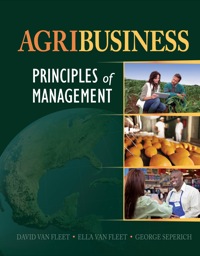It is well established that agribusiness involves the production and marketing of perishable commodities. Agribusiness appears to
Question:
It is well established that agribusiness involves the production and marketing of perishable commodities. Agribusiness appears to need only land, sunlight, and water. This would be a false impression. Ignoring other “soft” inputs like seeds and human capital, agribusiness also needs resources that are mined and manufactured.
These are “hard” inputs. Among the most important is potash—a unique entity with a unique history. On July 31, 1790, George Washington, first President of the United States, signed the first patent issued by the United States of America. The patent, assigned to Samuel Hopkins of Pittsford, Vermont, was for the making of “Pot Ash and Pearl Ash” by a new method. In the early days of the United States, potash was made from hardwood trees and other plants. It was used to make soap, glass, and salt peter for gunpowder. It was
one of the earliest and largest exports of a young country.
Today this humble mineral derived from the earth remains an essential crop fertilizer. The significance of potash for agriculture is simple. It is the prime source of the element potassium. Potassium is needed to activate at least 80 important enzymes in plants. In fact, without potassium, crops cannot reproduce and make grain, fruit, or vegetables. Potassium, along with phosphorus and nitrogen, are the “big three” of any fertilizer mix. They are necessary elements for plant growth and reproduction.
Approximately 13 countries are major producers of potash for world agribusinesses. Five countries (Canada, Belarus, Russia, China, and Germany, in descending order of production), account for 75 percent of world production. The global reserves of this mineral are estimated at approximately 8.3 billion tons. At current rates of production this should last 250 years. As the need for food production grows, a concomitant need is created for potash. The price of potash will reflect this need. Though plentiful, it must be mined, and this process uses a substantial amount of energy. The presence of potash is not evenly distributed on Earth; therefore, control of potash means control of production, market, and price.
In 2001, Billiton, a South African mining firm, merged with Broken Hill Proprietary (BHP), an Australian mining company. The combined South African-Australian company, BHP Billiton, is the world’s ninth largest company with a market capitalization approaching $190 billion and the largest mining company in the world.....
QUESTIONS
1. What form of control over potash should be used by the government of the country where it is located and by the corporations who purchase it?
2. What measures of performance would be appropriate for each of these?
3. What problems can you imagine on the horizon for agricultural businesses who buy potash and for the countries and the companies who control potash?
Step by Step Answer:

Agribusiness Principles Of Management
ISBN: 9781285952352,9781285947839
1st Edition
Authors: David Van Fleet, Ella Van Fleet, George J. Seperich





